St Basil’s inquest: Families claim parents ‘kept as prisoners’ in St Basil’s outbreak shutdown
A top health official told the federal government there was “no need” to evacuate St Basil’s residents, but a day later nurses discovered scenes of death and horror.
Coronavirus
Don't miss out on the headlines from Coronavirus. Followed categories will be added to My News.
The nation’s most senior nurse advised the federal government there was “no need” to evacuate St Basil’s residents a day before tearful nurses discovered scenes of death and horror.
On the same day, Victorian chief health officer Brett Sutton stood down the entire St Basil’s workforce, a decision described by an expert as one of the root causes of the deadly outbreak.
The shocking revelations were detailed Monday on the opening day of an inquest on 50 St Basil’s residents who died in July and August last year.
The inquest heard Australia’s chief nursing and midwife officer, Alison McMillan, was sent to St Basil’s on behalf of a “very concerned” Federal Department of Health secretary Brendan Murphy on July 22, 2020, as the Covid cluster worsened amid Victoria’s deadly second wave.
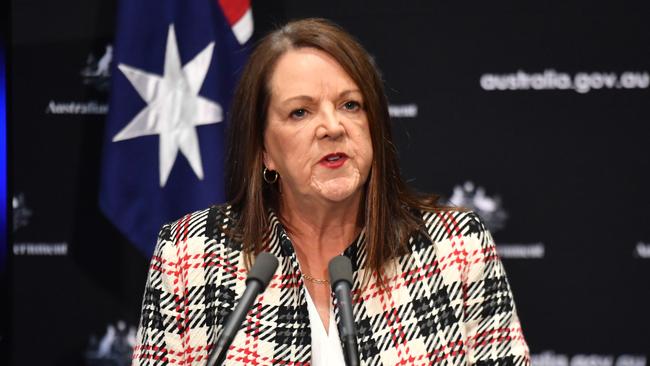
Documents before the inquest reveal Prof McMillan emailed Dr Murphy on the afternoon of July 22, saying she found a “fit for purpose facility” with “no need for a significant evacuation of positive residents to hospital”.
“On that basis, the question of transferring a significant number of Covid-19 positive residents out of St Basil’s was deferred,” court documents state. Aged Care Minister Richard Colbeck and Dr Murphy had earlier planned to move 40 positive residents for “risk minimisation”.
The next day, July 23, visiting Victorian Department of Health nurses found and photographed “horrific” conditions, with clients not being fed, sitting in soiled nappies for hours and suffering bedsores.
“We had one person pass away, we expected two more overnight, they’ve written many residents off as palliative, the place is a mess,” read a report from the nurses, who said they cried many times at the Fawkner home.
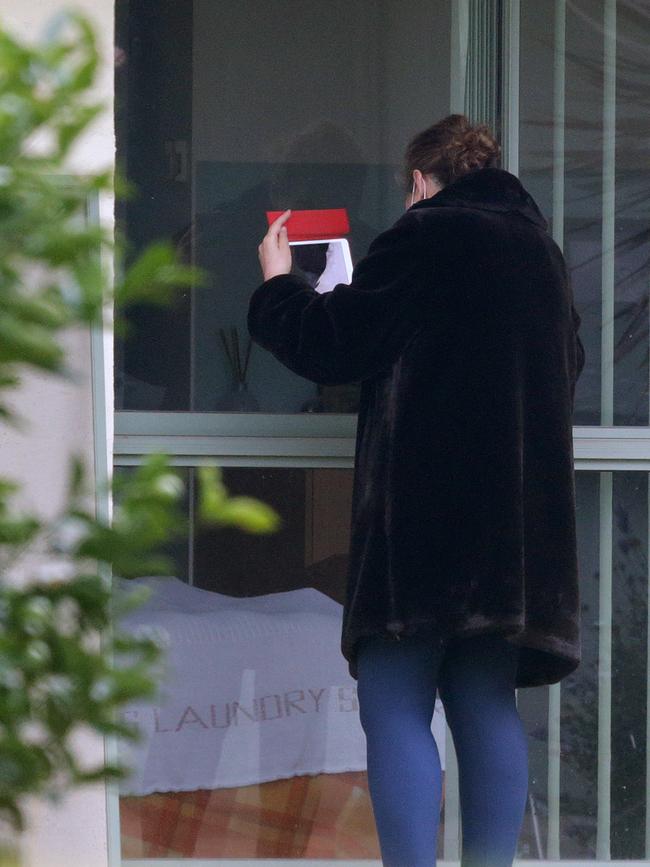
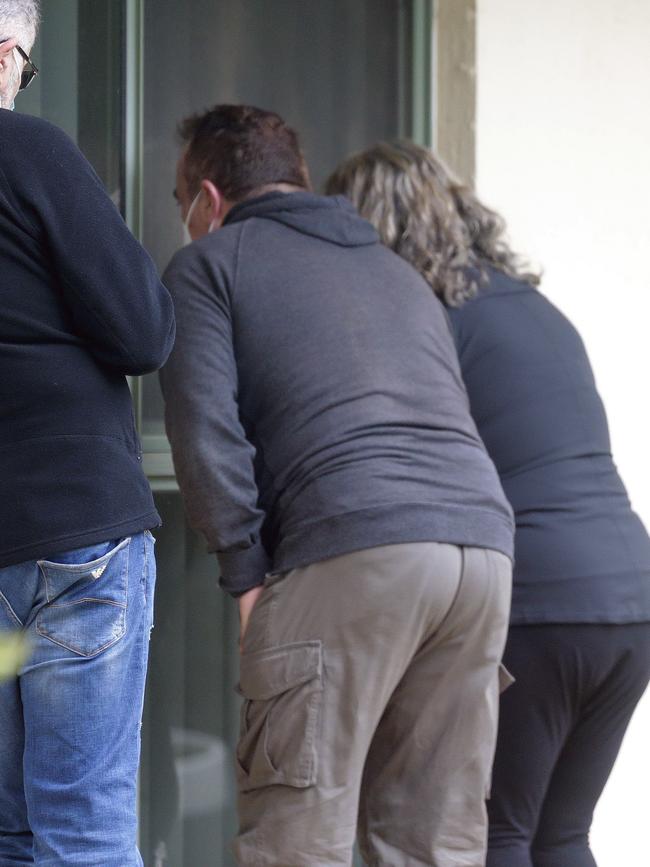
That report was forwarded to Commonwealth and state agencies, and the next day the transfer of residents – delayed due to Prof McMillan’s findings – was revived “as the true extent of the neglect became apparent to those at the highest levels of the commonwealth and Victorian governments”.
On July 22 – the day of Prof McMillan’s visit – Commonwealth agency staff had taken over the care of residents after Victorian chief health officer Brett Sutton stood down the St Basil’s workforce for being close contacts.
The “shocking idea” – dismissed by Northern Hospital doctors who feared residents would starve – was found by an expert to be one of the root causes of the deadly outbreak.
Disease outbreak specialist Dr Ian Norton, who is now the Victorian Aged Care Response Centre health lead, pointed to failures including a lack of co-ordination between state and federal departments, poor planning, an eight-day delay in testing infected workers and a decision to replace all workers at St Basil’s with inexperienced Commonwealth agency staff.
Dr Norton branded the lack of co-ordination as “preventable – even given the number of outbreaks in Victoria at the time”.
An earlier hearing was told many of the replacement workers had only been registered that year, had never worked in aged care and didn’t know how to shower residents.

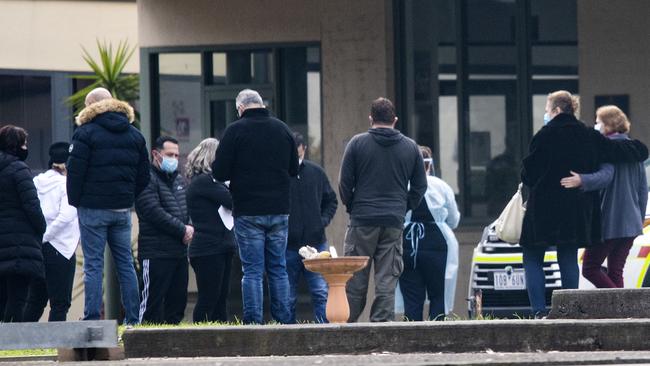
Council on the Ageing chief executive Ian Yates said that standing down an entire workforce without a transition plan would always lead to problems.
“In aged care, these are not commodities, these are people with very individual needs,” he said.
“You bring in a surge workforce to do a total swap, you are going to have problems because even with the higher skill and the best intentions, they are not going to know everything they need to know.”
Older Person’s Advocacy Network chief Craig Gear said what went on at St Basils was “harrowing and horrific”.
“The co-ordination, I think everyone realises there were lessons to be learnt there but it was a very complex and difficult situation,” Mr Gear said.
Victorian Opposition Leader Matthew Guy said: “This is a tragic example of what happens when governments don’t work together, and when the state government becomes obsessed with fighting the feds ...”
Federal Labor spokesman for ageing, Mark Butler, said it was “unforgivable that Scott Morrison did not have a plan for Covid-19 in aged care”.
A Victorian Department of Health spokesman said “many improvements have been made since the outbreak at St Basil’s and other privately-run aged care facilities which are regulated by the federal government”.
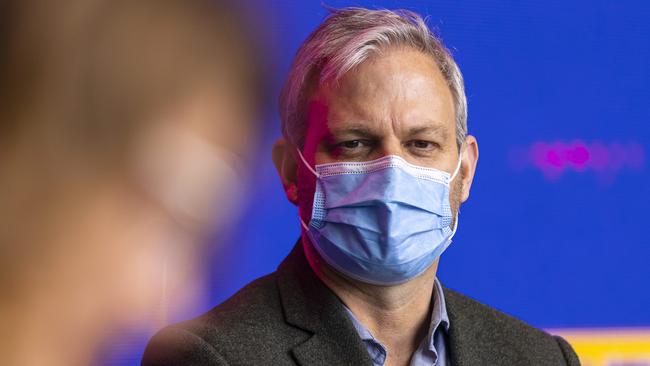
SUTTON’S ‘SHOCKING IDEA’ ADDED TO OUTBREAK
The “root cause” of the disastrous coronavirus cluster that claimed 50 lives at St Basil’s was a state and federal government’s failure to co-ordinate, poor Commonwealth planning and a massive delay in testing infected staff.
A recent report from specialist emergency physician Dr Ian Norton was handed to an inquest into the deaths of residents, who passed away during the second wave in July and August 2020.
The five-week inquest, which began on Monday, heard that Dr Norton labelled a lack of co-ordination between state and federal departments and other agencies as “preventable — even given the number of outbreaks in Victoria at the time”.
In a document to the court, Dr Norton said he was unaware of any planning by federal government agencies for multiple aged care coronavirus outbreaks, despite experiences overseas.

He also highlighted a decision by chief health officer Brett Sutton to replace all St Basil’s staff with a commonwealth workforce, despite it being dismissed by doctors from Northern Health as a “shocking idea”.
An eight-day delay between the first positive case and the testing of staff was also pointed to as a root cause for the deadly cluster.
The inquest began with a memorial to the 50 residents who died in the second wave, with their names read out and photos beamed to the court.
State Coroner Judge John Cain asked the dozens of people sitting in the court to stand as a “mark of respect” as the name and photo of each person was beamed on to a screen.
St Basil’s continues to be investigated by Worksafe for suspected breaches of the health and safety act.
Worksafe lawyer Chris Young QC said the watchdog was not currently probing the Victorian Department of Health.
‘FEELING OF IMPENDING DOOM’ BEFORE MUM DIED
Desperate families that tried to get into St Basil’s called police, telling them “our parents are kept prisoners in there”, as residents banged on windows in a bid to get out of the Covid-plagued home.
Christine Golding told an inquest on the 50 aged care residents who died that she went to the Fawkner home on July 26, 2020 – two weeks after its first confirmed Covid-19 case in a staffer – in the hope of seeing her 84-year-old mother, Efraxia Tsalanidis (pictured).
A “very concerned and afraid” Ms Golding said she and other families had not received any information about their loved ones and planned to dress in PPE and walk into the locked-down home.

But she said a nurse threatened to call the police if they did not leave.
Instead, one of their group, Jack, called Fawkner police station and told police “our parents are kept prisoners in there” as they watched residents call for help from inside.
“Some people started banging on the windows, family members, really really hard,” Ms Golding said.
The group walked around the back of the home, and Ms Golding saw her mother through a window, lying on her bed.
“Her eyes, they were terrible, lost, awful,” she said, describing how she took down the fly screen to photograph her mother.
The next day, Ms Tsalanidis was moved to the Peninsula Private Hospital where she arrived “dehydrated and exhausted”.
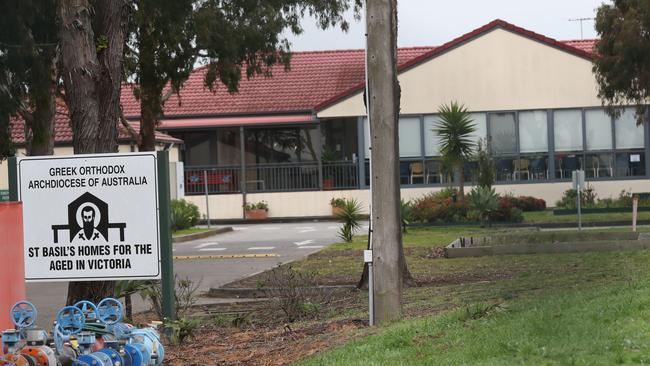
Two or three untouched plates of food were later found in her room at St Basil’s.
She said Peninsula hospital staff “could not believe” the condition the St Basil’s residents were in when they arrived.
Ms Golding’s window visit came four days after all St Basil’s staff were stood down under a directive from chief health officer Professor Brett Sutton.
Commonwealth agency workers – overwhelmed and inexperienced – took over the care of residents despite warnings of disastrous consequences if staff were replaced.
A St Basil’s nurse told Ms Golding on July 21 that staff were being replaced the next day and “When I’m gone, I can’t guarantee the safety of your mother”.
She said the nurse told her “if all staff were sent home that people would die from neglect rather than Covid”.
“That sent a shiver up my spine,” Ms Golding said.
“There was a feeling of impending doom.”
Ms Golding last saw her mother at Peninsula Private Hospital on August 8.
Dressed in full PPE, her mum, on morphine, nodded in acknowledgment that she was by her side.
“Never in a million centuries did I ever think that would be the way I would find my mother, I would get to spend the last moments with my mother,” she told the inquest.




